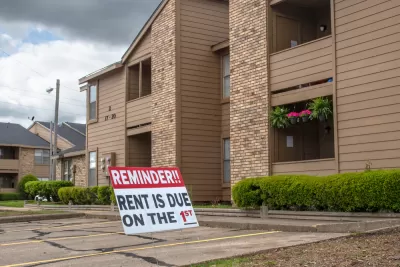More than a dozen states are using Community Development Block Grant funding from the CARES Act to fund emergency rental and mortgage assistance programs.

At least 15 states and the District of Columbia are using federally funded relief for renters. Colorado, Connecticut, Florida, Illinois, Iowa, Maryland, Massachusetts, Nevada, North Carolina, New Hampshire, New Jersey, Pennsylvania, Utah, Washington, Wyoming, and Washington, D.C., are using Community Development Block Grant funding from Congress’s March CARES Act to fund emergency rental and mortgage assistance programs.
Many of the programs are just getting underway, illustrating the challenge of quickly spinning up the gears of bureaucracy, especially amid a pandemic. But the crisis has forced some agencies to implement creative solutions that cut back on red tape and streamline processes for getting money out the door. The glaring inequitable impacts of COVID-19 have led some states to use new frameworks for disbursing funds. Though the programs are still in their infancy, their challenges and successes are already spurring conversations among advocates, community groups, and housing providers about how to use emergency rent relief after the pandemic.
The programs range widely from state to state. In some places, such as Massachusetts, the federal funds are expanding existing emergency rent relief programs. Many other states are building out entirely new programs. On the low end, Utah is using $3 million in CARES funding to seed its rent relief efforts. On the high end, Illinois and Pennsylvania are pumping $150 million of CARES funding into rent relief, with the latter state spending another $25 million in CARES funding on a separate mortgage relief effort. Even at the high end, officials see the programs as stopgap measures that will fall far short of helping every resident in need.
In Washington, the state legislature dedicated $100 million in CARES funding to create ...
FULL STORY: States Use CARES Act Funds to Keep Renters Afloat, But It Won’t Be Enough

Maui's Vacation Rental Debate Turns Ugly
Verbal attacks, misinformation campaigns and fistfights plague a high-stakes debate to convert thousands of vacation rentals into long-term housing.

Planetizen Federal Action Tracker
A weekly monitor of how Trump’s orders and actions are impacting planners and planning in America.

In Urban Planning, AI Prompting Could be the New Design Thinking
Creativity has long been key to great urban design. What if we see AI as our new creative partner?

King County Supportive Housing Program Offers Hope for Unhoused Residents
The county is taking a ‘Housing First’ approach that prioritizes getting people into housing, then offering wraparound supportive services.

Researchers Use AI to Get Clearer Picture of US Housing
Analysts are using artificial intelligence to supercharge their research by allowing them to comb through data faster. Though these AI tools can be error prone, they save time and housing researchers are optimistic about the future.

Making Shared Micromobility More Inclusive
Cities and shared mobility system operators can do more to include people with disabilities in planning and operations, per a new report.
Urban Design for Planners 1: Software Tools
This six-course series explores essential urban design concepts using open source software and equips planners with the tools they need to participate fully in the urban design process.
Planning for Universal Design
Learn the tools for implementing Universal Design in planning regulations.
planning NEXT
Appalachian Highlands Housing Partners
Mpact (founded as Rail~Volution)
City of Camden Redevelopment Agency
City of Astoria
City of Portland
City of Laramie





























